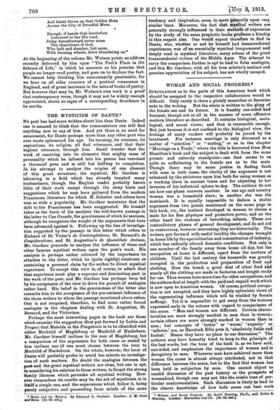THE MYSTICISM OF DANTE.*
No poet has bad more written about him than Dante. Indeed one is amazed to think that the commentators can still find anything new to say of him. And yet there is no need for amazement, for Dante perhaps more than any other poet who ever wrote epitomized his age. Its learning, its romance, its aspirations, its religion, all find utterance, and that their highest utterance, through him. Small wonder that the work of resolving into its elements that mighty mass of personality which he infused into his poems has exercised a thousand pens and is still but halfway to completion. In his attempt to analyse the origins of one element of this great structure, the mystical, Mr. Gardner is labouring in a field which has already tempted many husbandmen, though the English reader probably knows little of their work except through the stray hints and suggestions which he may have gathered from the modern Franciscan literature for which M. Sabatier and others have won so wide a popularity. Mr. Gardner maintains that the debt to the Franciscans has been exaggerated: He himself takes as the basis of his analysis the well-known passage in the letter to Can Grande, the genuineness of which he assumes, although he recognizes the weight of the arguments that have been advanced against it. Following up the line of investiga- tion suggested by the passage in this letter which refers to Richard of St. Victor's de Contemplatione, St. Bernard's de Coneideratione, and St. Augustine's de Quantitate Animae, Mr. Gardner proceeds to analyse the influence of these and other famous mystical writers upon the poet's work. His analysis is perhaps rather coloured by the importance he attaches to the letter, which be (quite rightly) construes as containing a personal claim by the author to direct mystical experience. To accept this view is, of course, to admit that that experience must play a supreme and dominating part in the work of the poet, and Mr. Gardner has perhaps been led by his acceptance of the view to drive his pursuit of analogies rather bard. His belief in the genuineness of the letter also commits him to the acceptance of the pre-eminent influence of the three writers to whom the passage mentioned above refers. One is not surprised, therefore, to find some rather forced analogies in the chapter& dealing with St. Augustine, St. Bennet], and the Victorines.
Perhaps the most interesting pages in the book are those which examine the suggestion (first put forward by Lubin and Preger) that Matelda in the Purgatorio is to be identified with either Mechtild of Magdeburg or Mechtild of Hackeborn. Mr. Gardner himself inclines to the nun of Magdeburg, but a comparison of the arguments for both cases as stated by him inclines one (if one must choose between the two) to
Mechtild of Hackeborn. On the whole, however, the lover of Dante will probably prefer to avoid too minute an investiga- tion of, such matters. No doubt the analogies between the poet and the great mystical writers are close, but one is apt, in considering his-relation to those writers, to forget the strong family likeness which pervades all -mystical writing. How- ever tremendous its results may be, the act of mysticism is in itself a simple one,.and the experiences which follow it, being purely subjective and proceeding from minds of the same • Dante and ad Mystics. By Edmund G. Gardner. London : J. M. Dent and-Boas. fys. 6d. net."
tendency and inspiration, seem to more generally upon very similar lines. Moreover, the fact that mystical writers are generally strongly influenced in their Methods of expression by the study of the same prophetic books produces a kinship in this respect also. One would expect therefore to find in Dante, who, whether or not he himself had transcendental experiences, was of an essentially mystical temperament and deeply read in mystical literature, many echoes of the great transcendental writers of the Middle Ages. The attempt to carry the comparison further is apt to lead to false analogies, and this Mr. Gardner, with all his true scholar's instinct and genuine appreciation of his subject, has not wholly escaped.


















































 Previous page
Previous page